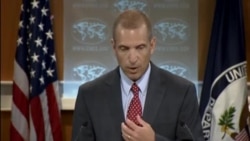The extradition treaty between Zimbabwe and the United States is about to be put to the test, in light of Zimbabwe’s extradition request for U.S. hunter, Walter Palmer, accused of killing Cecil, the country’s beloved lion.
The recent killing of the 13-year-old big cat, has set tongues wagging about the southern African country, which has often drawn attention for the anti-western stance spewed by its 91-year-old leader, Robert Mugabe, and its hyperinflation record, a few years ago.
In the first official comment since the uproar following revelations about the nature and circumstances of Cecil’s death, Zimbabwe's environment minister Oppah Muchinguri on Friday, appealed for Palmer’s extradition, accusing him and all involved in the animal’s killing, of poaching.
"From investigations carried out so far” said Muchinguri, “the professional hunter, client and land owner were therefore all engaged in poaching of the lion."
Muchinguri told a news conference in Harare, that extradition was necessary because, “it was too late to apprehend the foreign poacher as he had already absconded to his country of origin.”
Following the outcry of Cecil’s death, Palmer, who paid a reported $50,000 to hunt, has reportedly gone into hiding, and has not been seen at either his office and homes in Minnesota or Florida.
Zimbabwe and the U.S. signed an extradition treaty in July 1997 during the tenure of former U.S. President Bill Clinton, who described it at the time as a “significant step in bilateral cooperation between the United States and Zimbabwe, as it is the first extradition treaty between the two countries.”
The relationship between the two countries has since soured, following a controversial land reform program undertaken by Zimbabwe, accusations of vote-rigging and human rights violations,and decision by the U.S. to impose targeted sanctions on the country’s president and his close allies. Under the treaty, both countries pledged to cooperate, as follows stated in the extract below:Article 1 obligates the Contracting States to extradite to the other, pursuant to the provisions of the Treaty, any person charged with or convicted of an extraditable offense in the Requesting State.
Article 2(1) defines an extraditable offense as one punishable under the laws of both Contracting States by deprivation of liberty for a period of more than one year or by a more severe penalty. Use of such a “dual criminality” clause rather than a list of offenses covered by the Treaty obviates the need to renegotiate or supplement the Treaty as additional offenses become punishable under the laws of both Contracting States.
Article 2(2) states that an offense consisting of an attempt or a conspiracy to commit, aiding or abetting, counselling, causing or procuring the commission of or being an accessory before or after the fact to, an extraditable offense as described in Article 2(1) will also be an extraditable offense.
The offices of U.S. President Barack Obama, and the State Department headed by Secretary of State John Kerry, are under pressure to address the issue, following a petition containing thousands of signatures supporting the extradition, and the extradition request from Zimbabwe.
On Thursday, the White House said it would review a public petition to extradite Walter Palmer, noting it had exceeded a required 100,000 signatures. White House spokesman Josh Earnest said it would be up to the U.S. Justice Department to respond to an extradition order.
"Sounds like as though this particular petition has reached that threshold and so there will be a forthcoming white house response," Earnest said.
Meanwhile, at a State Department briefing on Friday in Washington, deputy spokesperson Mark Toner told reporters he was not aware of any formal communication from Zimbabwe regarding the extradition request, but explained that the discretion to honor an extradition request rested with the secretary of state, who will consider the rights of the accused to a fair trial, and humane treatment.
“Humanitarian concerns and the ability of the individual to receive a fair trial, may be considered at the point where the Secretary makes the final decision on whether to extradite,” Toner said, adding that decisions are made on a case by case basis.
Meanwhile, in Zimbabwe, reaction to Cecil’s killing has been mixed, with animal rights groups and conservationists condemning the practice, but many ordinary citizens pondering the world’s fuss over the incident, in light of their day to day struggles to survive.
Program director Jimmiel Mandima of the Africa Wildlife Foundation in Washington, told VOA’s Zimbabwe Service that the manner in which Cecil was killed, with a bow and arrow, as well as a gun, amounted to animal cruelty. Further he said, the killing defeated the reason for wildlife conservation.
“Wildlife for Zimbabwe and other southern African countries is a source of wealth and economic growth,” Mandima said, “and it is very clear from the media coverage that the way Cecil was killed was not intended to promote the very purpose of using wildlife as a source of economic growth.”
He said the positive side to the sad story of Cecil and the implications of hunting and poaching, is that it escalated escalating awareness across the globe about conservation of lions and other wildlife.







